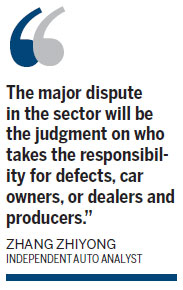Warranties protect car buyers
Updated: 2013-01-16 08:04
By Li Fangfang and Wang Xiaodong (China Daily)
|
||||||||

Regulation provides guarantees for services and replacement parts
Car buyers will be able to benefit from mandatory warranty services for the first time, according to a new regulation.
The regulation, published by China's quality control authority on Tuesday, stipulates responsibilities on the part of sellers for the repair, replacement and refund of private cars manufactured and sold in China.
The regulation, issued by the General Administration of Quality Supervision, Inspection and Quarantine, will take effect on Oct 1.
A private car is entitled to a repair service commitment for at least three years or 60,000 km, the regulation said.
Car sellers should replace a car for free or give a refund if serious quality problems are found with the car, such as malfunction of the braking system, within 60 days of the purchase or 3,000 km.
Consumers are entitled to free service for the replacement of key parts such as motors or transmissions if quality problems are found within 60 days of purchase or 3,000 km.
Violators of the regulation can receive warnings or be fined up to 30,000 yuan ($4,800) in serious cases, according to the regulation.
The new regulation has been welcomed by experts and customers, but with cautions.
"The regulation reflected the government's efforts to protect consumers' basic rights and benefits to the maximum extent," said Rao Da, secretary-general of the China Passenger Car Association.
"It's the first time that consumers can get refunds or replacement of their newly purchased cars according to a national regulation."
It is estimated that robust sales momentum will make the Chinese car market as big as that of Europe and the US combined by 2030.
A warranty service has been applied to most commodities in China, with a few exceptions including cars. With an increasing number of vehicles on the roads, quality concerns are also on the rise and a lack of legal protection has made consumers file complaints.
The China Consumers' Association received 16,805 complaints from car users in 2011. According to the China Association for Quality, 4,664 complaints were filed by car users in the first half of 2012, of which 30 percent were about engine problems.
"The regulation is welcome. However, the implementation is the key," said Jia Xinguang, an independent auto analyst in Beijing.
Liu Jingshan, a university teacher in Beijing, said the new regulation shows progress in protecting car users' rights.
"But I am not sure whether it will be well implemented and doubt related parties, including manufacturers and sellers, will shift responsibilities to each other when we ask for replacements or refunds," he said.
"The regulation will bring pressure to the industry with added costs to the after-sales sector in the short term after it takes effect. However, it will help promote the industry's healthy development in the long run," Jia said.
He said that China's auto industry is transforming from a single sales marketplace to a more mature industry with sales and after-sales service taking equal importance, after several years of domestic sales booms.
"More and more automakers realize the importance of brand imaging in the highly competitive market. Compared with technology and performance of the models, which require a five or even 10-year research and development cycle, competitive after-sales services may rapidly increase the brand image," Jia said.
"It's unreasonable that only the sellers take the responsibility of returning, refunding and repairing defective new cars," said Su Hui, an official with the China Automobile Dealers Association and former general manager of the Yayuncun Automobile Trade Market.
"The dealers only sell the vehicles and are not involved in the production of the models. So there should be further explanations to define the different responsibilities shouldered by dealers and producers.
Zhang Zhiyong, another independent auto analyst in Beijing, said that he believes the identification of defects is also a challenge to the implementation of the new regulation.
"Consumers will never 100 percent trust appraisal and evaluation by the automakers themselves, especially when they want to deal with defective cars," said Zhang.
"The major dispute in the sector will be the judgment on who takes the responsibility for defects, car owners, or dealers and producers."
(China Daily 01/16/2013 page3)

 In Photos: 7.0-magnitude quake hits Sichuan
In Photos: 7.0-magnitude quake hits Sichuan
 Li Na on Time cover, makes influential 100 list
Li Na on Time cover, makes influential 100 list
 FBI releases photos of 2 Boston bombings suspects
FBI releases photos of 2 Boston bombings suspects
 World's wackiest hairstyles
World's wackiest hairstyles
 Sandstorms strike Northwest China
Sandstorms strike Northwest China
 Never-seen photos of Madonna on display
Never-seen photos of Madonna on display
 H7N9 outbreak linked to waterfowl migration
H7N9 outbreak linked to waterfowl migration
 Dozens feared dead in Texas plant blast
Dozens feared dead in Texas plant blast
Most Viewed
Editor's Picks

|

|

|

|

|

|
Today's Top News
Live report: 7.0-magnitude quake hits Sichuan, heavy casualties feared
Boston suspect cornered on boat
Cross-talk artist helps to spread the word
'Green' awareness levels drop in Beijing
Palace Museum spruces up
First couple on Time's list of most influential
H7N9 flu transmission studied
Trading channels 'need to broaden'
US Weekly

|

|







